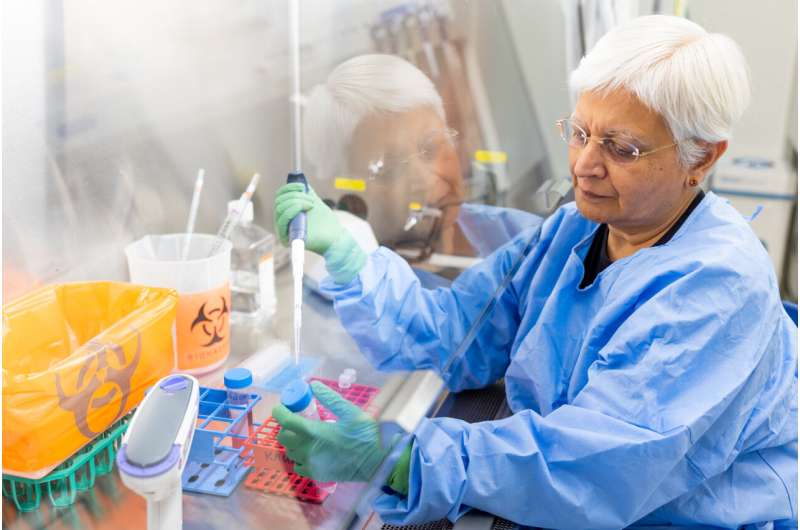This article has been reviewed according to Science X's editorial process and policies. Editors have highlighted the following attributes while ensuring the content's credibility:
fact-checked
peer-reviewed publication
trusted source
proofread
Study shows prior exposure to common virus shields against birth defects and miscarriage

Researchers at Tulane University have shown for the first time that mothers are much less likely to transmit a common virus known to cause miscarriages and birth defects if they are exposed to the virus prior to becoming pregnant. The study marks a significant step toward the development of a vaccine that could protect mothers and their babies.
Cytomegalovirus (CMV) is a common herpesvirus that most women contract unknowingly before reaching child-bearing age. It's usually harmless except during pregnancy when, if passed on to the developing fetus, it is a leading cause of miscarriage and birth defects, including cerebral palsy and hearing loss.
Researchers have long known that the risk for complications is particularly high for women infected by CMV for the first time during pregnancy, but they haven't fully understood why those who already carry the virus are less vulnerable.
The Tulane study reveals how pre-existing immunity to CMV effectively limits its transmission during pregnancy and protects against associated birth defects. The study, published in PLOS Pathogens, pinpoints the specific immune mechanisms responsible for that protection.
Researchers at the Tulane National Primate Research Center used a nonhuman primate model that closely mirrors human CMV infection and transmission. They observed that when pregnant mothers were initially infected with CMV during the first trimester, all of them transmitted the virus to their offspring, resulting in a high rate of miscarriage.
However, when nonhuman primates previously infected with CMV were reinfected during their pregnancies, their offspring were protected. The robust immune response observed in mothers upon reinfection resulted in only one out of five mothers passing the virus through the placenta, with no adverse health outcomes for any of the infants.
"Understanding how pre-existing immunity can protect against CMV transmission during pregnancy is crucial for developing an effective CMV vaccine that can safeguard all pregnant women and their unborn babies," said Dr. Amitinder Kaur, principal investigator and professor of microbiology and immunology.
The findings show that if a mother already has CMV immunity before becoming pregnant, her immune system can effectively protect her baby from congenital CMV transmission if she is reinfected during pregnancy. This research could have highly significant implications for the development of a CMV vaccine to prevent infections in pregnant women, particularly in areas with a high prevalence of CMV.
This study was made possible with research provided by first author Matilda Moström, Ph.D., assistant director of flow cytometry core at Tulane National Primate Research Center.
More information: Protective effect of pre-existing natural immunity in a nonhuman primate reinfection model of congenital cytomegalovirus infection, PLoS Pathogens (2023). DOI: 10.1371/journal.ppat.1011646 , journals.plos.org/plospathogen … journal.ppat.1011646



















